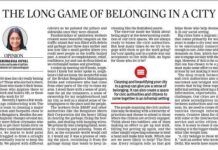This article Dynamics Of Project-Based Professions by Anuradha Goyal, author, and founder of IndiTales.com was first published by the New Indian Express newspaper on August 03, 2020.
Nepotism, cartels, or even gangs of influential professionals have been dominating the media and hence our minds. People from different backgrounds and professions are coming out with their struggles in the immensely competitive but highly visible industries. Writers spoke about closed doors of the publishing industry; musicians spoke about the biases of music companies. I have my own stories as an independent content creator. I am sure lawyers, chartered accountants, freelancers, and consultants of all kinds would have their own tales to tell about the project-based professions.
Dynamics of Project-Based Professions
Let us take an objective view of professions that are project-based in nature. You typically come together as a team of independent professionals for a project. Once finished, you move on to the next project with another team. The overlap between different teams is minimal at the beginning of your career but it increases with time as your network grows and as you become part of more and more projects. This model is prevalent in most creative fields.
Sometimes, you may form a close-knit team that you repeatedly work with due to the rapport that you build over time, or a sense of comfort, or simply a compatible working relationship.
When these close-knit teams get too strong, knowingly or unknowingly they create entry barriers for others, more often to get as much share of the business as possible. If they become monopolistic, deliberately blocking new entrants, they can harm the culture and overall quality standards of the industry.
Fair Play
Assume an ideal fair play scenario in such a creative industry, where anyone with the required qualifications and talent can come and work. How do people get discovered for projects? Most of the time these projects do not have clearly defined processes for selection, unlike the corporate sector. There are no organized sources to directly source talent like a bunch of colleges or institutes. Personal biases of decision-makers are bound to creep in. Add to this the fact that the work itself is short-term, highly diverse, and demands a different set of skills or profiles every time.
So, to get work, people need to be visible, they need to hustle. To find the right people for their projects, project owners need to keep an eye on new talent, they too need to hustle.
Sometimes agencies step in to manage this hustling, but more often than not, it happens informally, in social gatherings and public events. You get noticed for your visible work, that is why most people end up doing their initial projects for almost nothing. Initial projects are like an investment in building your professional resume.
Pricing
Putting on the price tag on your work is tricky. There are no standards whatsoever. Price is a function of your standing, your credibility, your past record, and most importantly how desperately the client needs you. There have been umpteen number of times when I have worked for a price only to realize that I could have easily quoted 2-4 times that price. Since most of these professions demand one’s personal time commitment, price is also a function of how much work you have on hand. Once you are well established, your price is also well established, but till then it’s a topsy turvy ride. In fact, when you have enough work at hand, you end up quoting an exorbitant price to say no, or to test waters. If you are not good with your accounts, you need to budget in for leakages of all kinds.
Revenue flow in these professions is as erratic as it can get. By design, there is no regular income, it comes in spurts. Your payments may depend on when your client gets paid. There may be few agencies between you and your client, and each step takes its cut as well as time. Your remuneration may be linked to the revenue of the end product. Forecasting revenue is tough and accounting of receipts hardly transparent. Take the case of author-publisher teams. No one can ever predict book sales. Once it is in the market, the author has no real visibility of the number of copies sold. A lot of things work on sheer faith, another reason why people tend to stick to people they trust.
Transparency in accounts is much needed, but because creators are not a community, they never come together to demand this. On the contrary, they end up competing unnecessarily.
New Entrants to Project-based Professions
Most new entrants in creative fields, with their eyes full of dreams, think life will be hunky-dory once they are successful. They see only the rewarding part of their dream professions. Nothing prepares them for the bumps on the road, the crowd they have to jostle through. Mentors can help but one has to be fortunate to find one. This makes me think about the artist guilds that worked in the good old days that moved as a community for different projects. I can see a stark difference in the creation-creator relationship. Maybe we need to go back and study these models! Till then, being aware of what you are getting into can help you deal with it.

Edited for this online publication.








